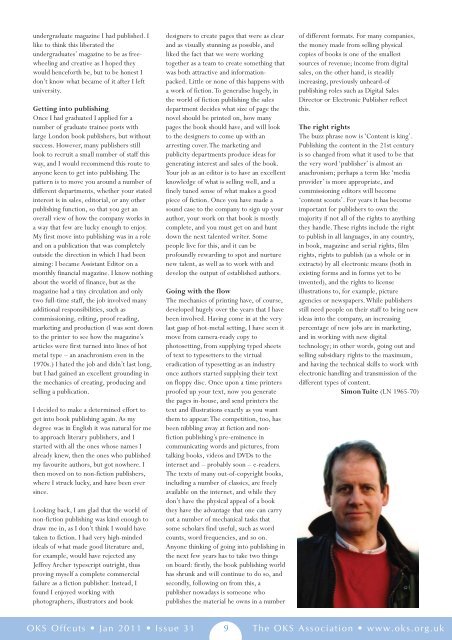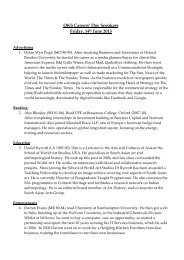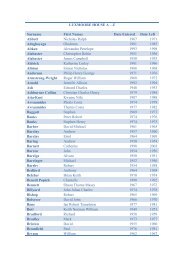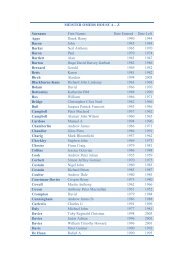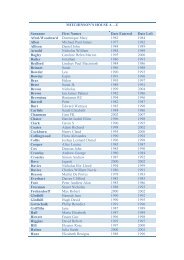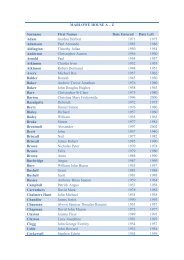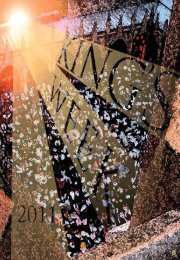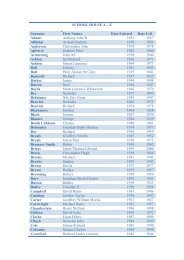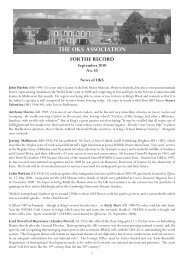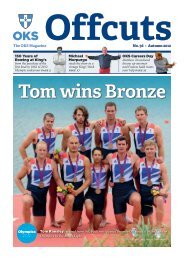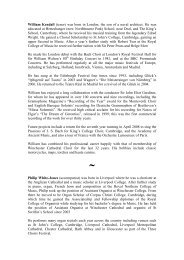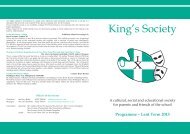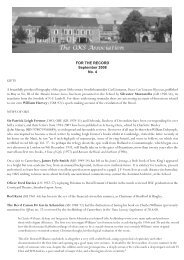January 2011 offcuts_Jan Offcuts 2010.qxd.qxd - The OKS Association
January 2011 offcuts_Jan Offcuts 2010.qxd.qxd - The OKS Association
January 2011 offcuts_Jan Offcuts 2010.qxd.qxd - The OKS Association
Create successful ePaper yourself
Turn your PDF publications into a flip-book with our unique Google optimized e-Paper software.
undergraduate magazine I had published. I<br />
like to think this liberated the<br />
undergraduates’ magazine to be as freewheeling<br />
and creative as I hoped they<br />
would henceforth be, but to be honest I<br />
don’t know what became of it after I left<br />
university.<br />
Getting into publishing<br />
Once I had graduated I applied for a<br />
number of graduate trainee posts with<br />
large London book publishers, but without<br />
success. However, many publishers still<br />
look to recruit a small number of staff this<br />
way, and I would recommend this route to<br />
anyone keen to get into publishing. <strong>The</strong><br />
pattern is to move you around a number of<br />
different departments, whether your stated<br />
interest is in sales, editorial, or any other<br />
publishing function, so that you get an<br />
overall view of how the company works in<br />
a way that few are lucky enough to enjoy.<br />
My first move into publishing was in a role<br />
and on a publication that was completely<br />
outside the direction in which I had been<br />
aiming: I became Assistant Editor on a<br />
monthly financial magazine. I know nothing<br />
about the world of finance, but as the<br />
magazine had a tiny circulation and only<br />
two full-time staff, the job involved many<br />
additional responsibilities, such as<br />
commissioning, editing, proof reading,<br />
marketing and production (I was sent down<br />
to the printer to see how the magazine’s<br />
articles were first turned into lines of hot<br />
metal type – an anachronism even in the<br />
1970s.) I hated the job and didn’t last long,<br />
but I had gained an excellent grounding in<br />
the mechanics of creating, producing and<br />
selling a publication.<br />
I decided to make a determined effort to<br />
get into book publishing again. As my<br />
degree was in English it was natural for me<br />
to approach literary publishers, and I<br />
started with all the ones whose names I<br />
already knew, then the ones who published<br />
my favourite authors, but got nowhere. I<br />
then moved on to non-fiction publishers,<br />
where I struck lucky, and have been ever<br />
since.<br />
Looking back, I am glad that the world of<br />
non-fiction publishing was kind enough to<br />
draw me in, as I don’t think I would have<br />
taken to fiction. I had very high-minded<br />
ideals of what made good literature and,<br />
for example, would have rejected any<br />
Jeffrey Archer typescript outright, thus<br />
proving myself a complete commercial<br />
failure as a fiction publisher. Instead, I<br />
found I enjoyed working with<br />
photographers, illustrators and book<br />
designers to create pages that were as clear<br />
and as visually stunning as possible, and<br />
liked the fact that we were working<br />
together as a team to create something that<br />
was both attractive and informationpacked.<br />
Little or none of this happens with<br />
a work of fiction. To generalise hugely, in<br />
the world of fiction publishing the sales<br />
department decides what size of page the<br />
novel should be printed on, how many<br />
pages the book should have, and will look<br />
to the designers to come up with an<br />
arresting cover. <strong>The</strong> marketing and<br />
publicity departments produce ideas for<br />
generating interest and sales of the book.<br />
Your job as an editor is to have an excellent<br />
knowledge of what is selling well, and a<br />
finely tuned sense of what makes a good<br />
piece of fiction. Once you have made a<br />
sound case to the company to sign up your<br />
author, your work on that book is mostly<br />
complete, and you must get on and hunt<br />
down the next talented writer. Some<br />
people live for this, and it can be<br />
profoundly rewarding to spot and nurture<br />
new talent, as well as to work with and<br />
develop the output of established authors.<br />
Going with the flow<br />
<strong>The</strong> mechanics of printing have, of course,<br />
developed hugely over the years that I have<br />
been involved. Having come in at the very<br />
last gasp of hot-metal setting, I have seen it<br />
move from camera-ready copy to<br />
photosetting, from supplying typed sheets<br />
of text to typesetters to the virtual<br />
eradication of typesetting as an industry<br />
once authors started supplying their text<br />
on floppy disc. Once upon a time printers<br />
proofed up your text, now you generate<br />
the pages in-house, and send printers the<br />
text and illustrations exactly as you want<br />
them to appear. <strong>The</strong> competition, too, has<br />
been nibbling away at fiction and nonfiction<br />
publishing’s pre-eminence in<br />
communicating words and pictures, from<br />
talking books, videos and DVDs to the<br />
internet and – probably soon – e-readers.<br />
<strong>The</strong> texts of many out-of-copyright books,<br />
including a number of classics, are freely<br />
available on the internet, and while they<br />
don’t have the physical appeal of a book<br />
they have the advantage that one can carry<br />
out a number of mechanical tasks that<br />
some scholars find useful, such as word<br />
counts, word frequencies, and so on.<br />
Anyone thinking of going into publishing in<br />
the next few years has to take two things<br />
on board: firstly, the book publishing world<br />
has shrunk and will continue to do so, and<br />
secondly, following on from this, a<br />
publisher nowadays is someone who<br />
publishes the material he owns in a number<br />
of different formats. For many companies,<br />
the money made from selling physical<br />
copies of books is one of the smallest<br />
sources of revenue; income from digital<br />
sales, on the other hand, is steadily<br />
increasing, previously unheard-of<br />
publishing roles such as Digital Sales<br />
Director or Electronic Publisher reflect<br />
this.<br />
<strong>The</strong> right rights<br />
<strong>The</strong> buzz phrase now is ‘Content is king’.<br />
Publishing the content in the 21st century<br />
is so changed from what it used to be that<br />
the very word ‘publisher’ is almost an<br />
anachronism; perhaps a term like ‘media<br />
provider’ is more appropriate, and<br />
commissioning editors will become<br />
‘content scouts’. For years it has become<br />
important for publishers to own the<br />
majority if not all of the rights to anything<br />
they handle. <strong>The</strong>se rights include the right<br />
to publish in all languages, in any country,<br />
in book, magazine and serial rights, film<br />
rights, rights to publish (as a whole or in<br />
extracts) by all electronic means (both in<br />
existing forms and in forms yet to be<br />
invented), and the rights to license<br />
illustrations to, for example, picture<br />
agencies or newspapers. While publishers<br />
still need people on their staff to bring new<br />
ideas into the company, an increasing<br />
percentage of new jobs are in marketing,<br />
and in working with new digital<br />
technology; in other words, going out and<br />
selling subsidiary rights to the maximum,<br />
and having the technical skills to work with<br />
electronic handling and transmission of the<br />
different types of content.<br />
Simon Tuite (LN 1965-70)<br />
<strong>OKS</strong> <strong>Offcuts</strong> • <strong>Jan</strong> <strong>2011</strong> • Issue 31<br />
9<br />
<strong>The</strong> <strong>OKS</strong> <strong>Association</strong> • www.oks.org.uk


